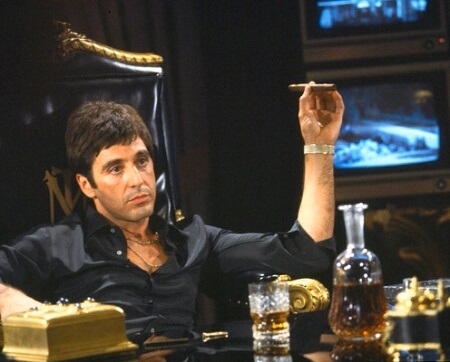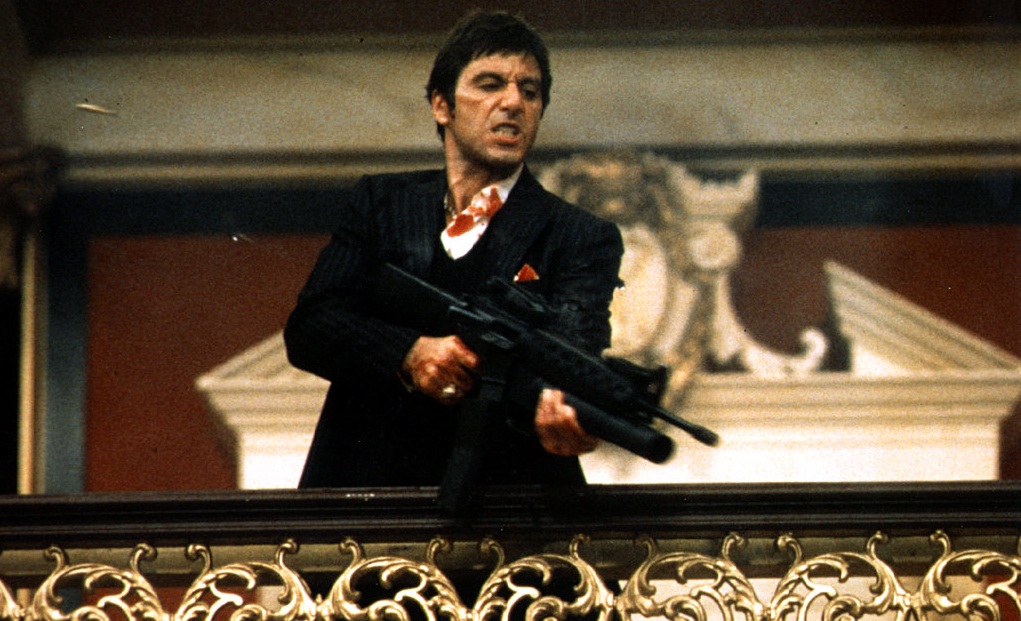 Something that always interests me as a cinephile is the evolution of film criticism and how the prevailing opinions of films can be shaped and changed by time; much in the same fashion that time tends to alter entire landscapes and shake sturdy mountains. Films that, upon their initial release, are touted as violent, trashy exploitation by the established film literati can grow and evolve into widely heralded classics. Such is the case with 1983’s Scarface. We hope you’ll consider revisiting this bloody triumph via Netflix Watch Instantly service over the weekend.
Something that always interests me as a cinephile is the evolution of film criticism and how the prevailing opinions of films can be shaped and changed by time; much in the same fashion that time tends to alter entire landscapes and shake sturdy mountains. Films that, upon their initial release, are touted as violent, trashy exploitation by the established film literati can grow and evolve into widely heralded classics. Such is the case with 1983’s Scarface. We hope you’ll consider revisiting this bloody triumph via Netflix Watch Instantly service over the weekend.
Who Made It: Scarface was written by Oliver Stone, who himself directed classic films like Platoon, Wall Street, and JFK. Brian De Palma, of Carrie and Dressed to Kill fame, directed the film. Scarface, at the time of its release, was a major departure for De Palma in terms of both his usual subject material and his usual style. Scarface is actually a remake of a 1932 film directed by Howard Hawks.
Who’s In It: The film stars Al Pacino in one of his most iconic roles. The film also stars Michelle Pfeiffer, Steven Bauer, Robert Loggia, and Mary Elizabeth Mastrantonio.
What’s It About: Scarface is the story of a Cuban immigrant who, upon arriving in America, turns almost immediately to a life of crime. He slowly rises from errand boy for a local drug pusher to becoming the narcotics kingpin of Miami. But his greed, his ambition, and his growing propensity to get high on his own supply lead him to inch closer and closer to a downfall of Biblical proportions.
Why You Should Watch It:
The biggest and simplest reason to watch Scarface is its star Al Pacino. Pacino was less than a decade removed from The Godfather Part II when he crafted yet another progenitor gangster role. His Tony Montana is however a vastly different criminal than Michael Corleone. Where Michael is a quiet, calculating mastermind who hardly ever seems rattled, Tony is a roaring hurricane of thundering expletives and savage violence. He doesn’t maneuver his way to the top as much as he does claw with razor-sharp talons, which he’s more than happy to unsheathe should anyone cross him or stand in his way. He’s flashy, loud, and unrepentantly evil. So why do we love him so much?
Plenty of film critics and historians have already observed that Tony Montana is, for all his innumerable faults, a champion of the American dream. Tony comes to this country with absolutely nothing and dreams of wealth, power, and prominence. His methods of achieving those goals are obviously repellant, and yet we can empathize with his ambition and his refusal to accept the position life has handed him. This is really the core of any great gangster story going back to the days of Al Capone. In fact, the 1930s gangster movie of which Scarface is a remake was based on a book by Armitage Trail which was itself based on the life of Capone. Merely replace bootleg liquor with cocaine and it isn’t hard to see how easily these themes correspond.

Scarface is a landmark film in a number of ways. First and foremost, it produced one of cinema’s all time great villains, and his quips and speeches are etched into our collective consciousness. It seems we can’t go a year without at least one film referencing “say hello to my little friend.” But apart from inspiring and informing subsequent celluloid bad guys, Scarface has certainly earned its reputation as a cultural phenomenon.
Rap culture in particular was quick to embrace the mythos of Tony Montana; many artists citing it as their favorite film and even a major influence on their work and their lifestyle. Lines from the movie frequently turn up in hip-hop lyrics and there is even a rapper who calls himself Scarface. But the influential reach of Brian De Palma’s extends yet further, and ventures to some very strange places. For example, Saddam Hussein apparently named his money laundering front Montana Management after the film’s antagonistic protagonist; not a ringing endorsement of course, but a further testament to the worldwide influence of Scarface.


